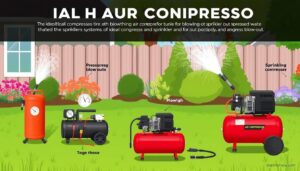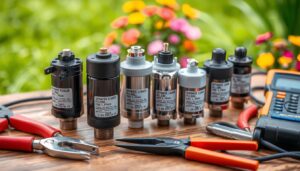Are you frustrated with your sprinkler heads constantly leaking? It’s a common problem that many homeowners face, but understanding why it happens can help you find the right solution.
The truth is, there are several common causes for sprinkler head leaks, and identifying them is the first step towards fixing the issue. In this informative article, we will delve into the technical details of why your sprinkler heads may be leaking and provide you with step-by-step instructions on how to identify and fix the problem yourself.
We’ll also share some valuable tips on preventing future leaks and discuss when it’s best to call a professional for assistance. Don’t let those pesky leaks ruin your lawn! By taking action now, you can ensure your sprinkler system functions efficiently and effectively all year round.
Common Causes of Sprinkler Head Leaks
Wondering why your sprinkler heads are leaking? Let’s explore the common causes of those pesky leaks!
One of the main causes of sprinkler head leaks is corrosion. Over time, sprinkler heads can become corroded due to the constant exposure to water and other elements. Corrosion weakens the integrity of the sprinkler head, leading to leaks and possible damage to your landscape.
Weather conditions also play a significant role in causing sprinkler head leaks. Extreme temperatures, such as freezing cold or scorching heat, can cause the plastic components of the sprinkler head to expand or contract, resulting in cracks or ruptures. Additionally, heavy rainstorms or high winds can put excessive pressure on the system, causing joints to loosen and leaks to occur.
To identify a sprinkler head leak, look for signs such as soggy patches in your lawn or water pooling around the base of the sprinklers. You may also notice reduced water pressure or uneven watering patterns. If you suspect a leak, it’s essential to address it promptly to prevent further damage and wasted water.
Now that we’ve explored what causes these leaks, let’s move on to how you can effectively identify them without any professional assistance.
How to Identify a Sprinkler Head Leak
If you suspect a sprinkler head leak, there are several key points to look out for.
Firstly, keep an eye out for visible water pooling or spraying around the sprinkler head. This is a clear sign that there’s a leak in the system.
Secondly, check for uneven water distribution in your lawn or garden. If certain areas are getting more water than others, it could indicate a leak in one of the sprinkler heads.
Lastly, if you notice an increase in your water usage without any obvious explanation, it could be due to a sprinkler head leak that needs to be addressed promptly.
Visible water pooling or spraying
When sprinkler heads leak, it’s important to address visible water pooling or spraying as it can indicate a potential issue with the system. To identify and resolve this problem, follow these steps:
- Check the water pressure: High water pressure can cause sprinkler heads to leak. Use a pressure gauge to measure the pressure at different zones of your irrigation system.
- Inspect the sprinkler heads: Look for any signs of damage or wear on the sprinkler heads. Cracked or broken components can lead to leaks.
- Perform proper maintenance: Regularly clean and inspect your sprinkler heads to ensure they’re functioning correctly. Remove any debris that may be blocking the nozzles.
- Adjust the spray pattern: Improperly adjusted or misaligned sprinkler heads can cause water to pool or spray in unintended areas.
By addressing visible water pooling or spraying and following these steps, you can prevent further issues with your irrigation system. This’ll help ensure even water distribution throughout your lawn without wasting excess water or causing damage.
Uneven water distribution
To ensure a healthy and vibrant lawn, it’s crucial to address uneven water distribution. This issue can result in up to 50% of water waste. One common cause of this issue is inadequate water pressure. Insufficient water pressure can lead to some sprinkler heads receiving less water than others, resulting in uneven watering across your lawn.
Another possible cause is clogged nozzles. Over time, mineral deposits or debris can accumulate in the nozzle openings, obstructing the flow of water and causing it to spray unevenly. Regular maintenance, such as cleaning or replacing clogged nozzles and ensuring proper water pressure, can help resolve this problem and ensure even water distribution throughout your lawn.
By addressing these issues promptly, you can avoid increased water usage and potential damage to your landscape caused by under-watering or over-watering certain areas.
Increased water usage
You can significantly reduce water waste by addressing increased water usage in your lawn, ensuring a more sustainable and environmentally-friendly approach to irrigation. Increased water usage can lead to excessive runoff and inefficient distribution, resulting in higher water bills and wasted resources.
To conserve water and minimize the impact on your utility expenses, it’s important to monitor your sprinkler system’s settings regularly. Adjust the watering schedule based on weather conditions, such as rain or humidity levels, to prevent overwatering. Additionally, inspect the sprinkler heads for any leaks or malfunctions. Leaky sprinkler heads not only waste water but also contribute to uneven distribution, further increasing water consumption.
By promptly fixing these issues, you can save both water and money while promoting a healthier lawn.
Moving on to steps to fix a sprinkler head leak…
Steps to Fix a Sprinkler Head Leak
One common issue with sprinkler heads is that they can leak, which is like having a faucet that drips incessantly, wasting water and potentially causing damage to your lawn. If you notice a leaky sprinkler head, don’t panic! There are several troubleshooting tips and DIY repair methods you can try before calling in the professionals. Here’s a step-by-step guide to help you fix the problem:
- Turn off the water supply: Before attempting any repairs, make sure to turn off the water supply to prevent further leakage.
- Inspect the sprinkler head: Check for any visible cracks or damage on the sprinkler head itself. If you find any, it’s likely that replacing the head will solve the issue.
- Clean or replace the nozzle: Sometimes, debris or dirt can clog the nozzle and cause leaks. Remove the nozzle and clean it thoroughly using a small brush or replace it if necessary.
- Adjust or replace the seal: The seal between the sprinkler body and riser pipe may be worn out or damaged, leading to leaks. Try adjusting it first by tightening or loosening it slightly. If that doesn’t work, consider replacing it.
By following these troubleshooting tips and DIY repair methods, you should be able to fix most common sprinkler head leaks yourself. However, if you’re unable to resolve the issue or need assistance with more complex repairs, it’s always recommended to consult a professional.
In our next section, we’ll discuss some helpful tips for preventing sprinkler head leaks altogether without writing ‘step’.
Tips for Preventing Sprinkler Head Leaks
Now that you know how to fix a sprinkler head leak, let’s talk about some tips for preventing these leaks in the first place. By following these steps, you can avoid water wastage and maintain a healthy lawn.
Firstly, make sure to regularly inspect your sprinkler heads for any signs of damage or wear. Look out for cracks, leaks, or misaligned heads. Replace any damaged parts immediately to prevent further issues.
Next, it’s important to adjust your sprinkler system according to the changing seasons. As weather conditions vary throughout the year, so do the watering needs of your lawn. Adjusting the watering schedule and duration accordingly will help prevent overwatering or underwatering your lawn.
Another tip is to keep an eye on the water pressure in your sprinkler system. High water pressure can lead to leaks and bursts in your sprinkler heads. Use a pressure regulator if necessary to ensure a consistent and safe flow of water.
Lastly, regular maintenance is crucial for preventing sprinkler head leaks. Clean out any debris from the heads regularly and check for clogged nozzles or filters. This will ensure proper functioning and prevent blockages that could cause leaks.
By following these preventive measures, you can minimize the chances of experiencing sprinkler head leaks and promote efficient water usage in your lawn. Now let’s move on to when it may be necessary to call a professional for help with your sprinkler system without writing ‘step’.
When to Call a Professional for Help
If you’re unsure about the complexity of your sprinkler system, it might be time to consider calling a professional for assistance. While some minor sprinkler head leaks can be fixed on your own, there are certain signs that indicate a serious problem that requires expert attention. Here are a few key indicators that it’s time to call in the pros:
- Water pooling: If you notice water pooling around your sprinkler heads even when they are turned off, it could be a sign of a significant leak in the system.
- Reduced water pressure: A noticeable decrease in water pressure from your sprinklers could indicate a blockage or leak within the system.
- Constantly damp areas: If you have consistently wet and soggy patches in your lawn or garden, it may suggest an underground leak that needs professional expertise to locate and fix.
- Frequent repairs: If you find yourself constantly repairing or replacing sprinkler heads due to leaks, it’s worth getting a professional evaluation to identify any underlying issues.
By recognizing these signs and knowing when to call for help, you can prevent further damage and ensure the longevity of your sprinkler system. Moving forward, let’s explore the importance of fixing sprinkler head leaks…
Importance of Fixing Sprinkler Head Leaks
Imagine standing in a garden, watching as precious water trickles away through tiny cracks, like whispers escaping into the air. It’s a frustrating sight, but it also highlights the importance of fixing sprinkler head leaks promptly.
Regular sprinkler maintenance brings numerous benefits to your irrigation system and landscape, preventing potential damage caused by these leaks. When sprinkler heads leak, they not only waste water but also compromise the efficiency of your irrigation system. The leaking water can create muddy areas in your lawn or garden, causing soil erosion and potentially damaging plants and flowers. Additionally, this excess moisture can attract pests such as mosquitoes or fungus that thrive in damp environments.
By addressing sprinkler head leaks promptly, you can avoid these problems. Regular maintenance allows you to detect any issues early on and fix them before they escalate. This includes inspecting all sprinkler heads for signs of leakage and ensuring proper adjustment and alignment.
Incorporating routine maintenance into your schedule will save you money in the long run by reducing water waste and preventing costly repairs due to extensive damage caused by neglected leaks. So don’t let those tiny cracks drain away your resources; take action today to fix those sprinkler head leaks!
Frequently Asked Questions
Can a sprinkler head leak be caused by a faulty valve?
A faulty valve can indeed cause a sprinkler head leak. When the valve fails to close properly, it allows water to continue flowing through the system, which can lead to excessive pressure and ultimately cause leaks in the sprinkler heads.
To prevent this, regular sprinkler head maintenance is crucial. Common causes of sprinkler head leaks include worn-out valves, debris clogging the valve or nozzle, and improper installation. Proper maintenance and timely repairs can help avoid these issues.
Are there different types of sprinkler heads that are more prone to leaking?
Sprinkler head maintenance is crucial to prevent leaks. There are various types of sprinkler heads, and some may be more prone to leaking than others.
The most common causes of sprinkler head leaks include worn-out seals, clogged nozzles, or damaged diaphragms. Regularly inspecting and cleaning the heads can help identify and resolve these issues.
Additionally, ensuring proper water pressure and avoiding excessive force while adjusting the heads can also prevent leaks from occurring.
Can water pressure issues contribute to sprinkler head leaks?
Water pressure maintenance is crucial in preventing sprinkler head leaks. High water pressure can cause stress on the sprinkler system, leading to cracked or damaged components, including the heads. On the other hand, low water pressure may result in inadequate sealing of the heads, causing leaks.
Common causes of sprinkler head leaks include worn-out seals, debris buildup, and improper installation. Regularly checking and maintaining your water pressure will help minimize these issues and prolong the lifespan of your sprinkler system.
How can I tell if my sprinkler head is leaking underground?
To determine if your underground sprinkler head is leaking, there are a few signs to look out for. First, check for any areas with excessive wetness or pooling water around the sprinkler head.
You may also notice a decrease in water pressure or uneven watering patterns. Inspect the surrounding soil for signs of erosion or bubbling.
If you observe any of these indicators, it’s crucial to seek professional underground sprinkler repair services promptly to prevent further damage and conserve water resources.
Can improper installation or damage during landscaping cause sprinkler head leaks?
Improper installation or damage during landscaping can indeed cause sprinkler head leaks. If the heads aren’t installed correctly, they may not be able to seal properly, leading to leaks.
Additionally, if the heads are damaged while landscaping activities are being carried out, such as by heavy machinery or tools, it can result in cracks or breaks that allow water to escape.
It’s important to ensure proper maintenance and regular inspection of your sprinkler system due to the effects of weather on sprinkler heads.

I’m Carlos Robert, a passionate gardener, and blogger. With years of experience and knowledge in the field of garden watering, I have created a blog to share my insights and tips on the topic. I strive to provide readers with detailed information about all aspects of sprinkler systems, from garden sprinklers to fire sprinklers, along with nozzles, hoses, and other related products. I love helping my readers create the perfect garden with their ideal setup!


